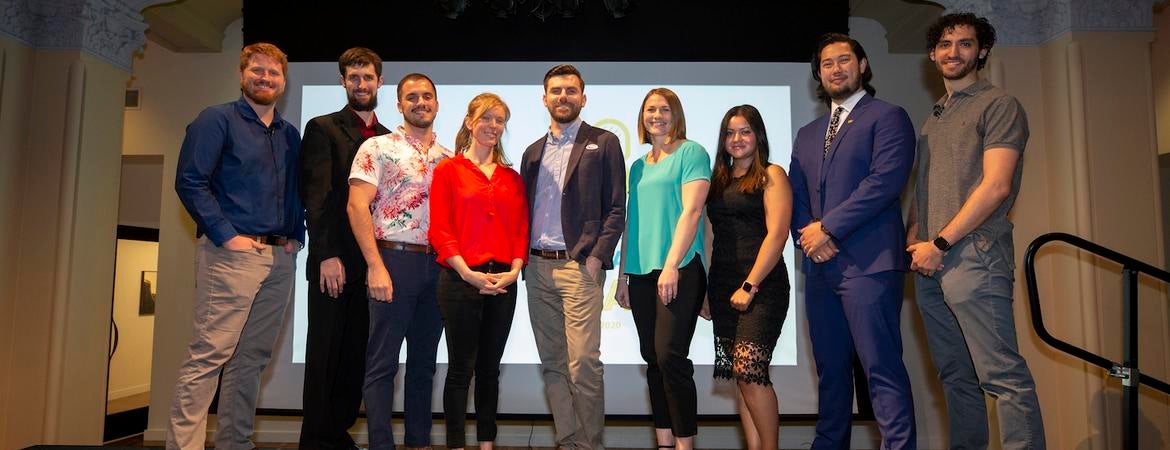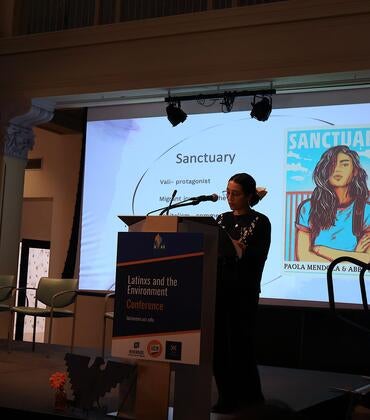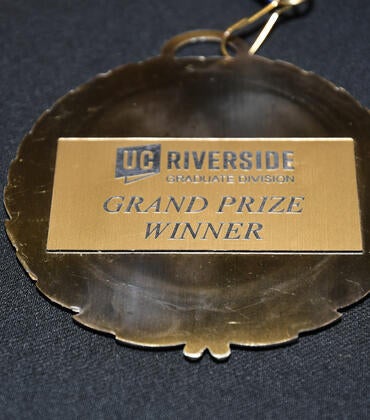A doctoral student in music took home top honors at UC Riverside’s Grad Slam 2020, a UC-wide competition that brings graduate students out of their labs and libraries to give elevator pitches about their research for the chance to win fellowships.
The winner, Eric Johns, received the award for his presentation on the Afro-Argentinian origins of the tango on March 3 at the Culver Center for the Arts in downtown Riverside. A panel of judges evaluated the nine finalists on clarity, organization, delivery visual appeal, appropriateness, intellectual significance, and engagement. Audience members voted for the Audience Choice award.
Part Shark Tank-style pitch competition and part TED talk, graduate students distill their research or creative projects into three-minute presentations with a maximum of three PowerPoint slides and present them to a nonspecialist audience. The winner from each UC campus moves forward to a final competition for the UC systemwide championship and up to $7,000.
Johns is documenting the deliberate erasure of black musicians who helped invent the tango to prop up Argentina’s official ideology as a white nation with no indigenous people or people of color. His presentation included snippets of original recordings he found in archives and later recordings in which the instruments played by black musicians were replaced by instruments played by white musicians.
Johns will receive a $5,000 fellowship and go on to compete in the UC Office of the President Grad Slam Finals held May 8 at LinkedIn’s downtown San Francisco center and emceed by UC President Janet Napolitano.
Thomas Dugger, a doctoral student in materials science and engineering, received a $2,000 runner-up fellowship for his presentation on his work developing a flexible polymer that delivers salicylic acid, the active ingredient in aspirin, directly where it’s needed.
Ethan Castro, a doctoral student of digital composition, received a second runner-up $1,000 fellowship for his presentation on his ResonX project, which uses tactile inducers to transform sound into vibration so deaf people can enjoy music.
Biagio DiSalvo a doctoral student in plant pathology, won the audience over with a humorous presentation about his work to save vineyards from a pathogen called Xylella fastidiosa with a biofilm produced by harmless bacteria found in grapevine roots that can prevent the pathogen from progressing. He received a $1,000 fellowship for the Audience Choice award.
The following contestants received Honorable Mentions and $100 each:
- Mark Wiley, biomedical sciences. Wiley is researching novel therapeutic approaches to treating obesity through the body’s endocannabinoid system.
- Samiksha Singh, environmental sciences. Singh is studying samples from three rivers in Southern California to learn about microplastic transport routes to the ocean.
- William Ota; evolution, ecology and organismal biology. Ota is studying how effluent in the Santa Ana river is changing communities of native and invasive fish.
- Danielle Stevenson, environmental toxicology. Stevenson is identifying microrrhizal fungi across America that can block metals and increase crop yields, optimizing their application in greenhouses.
- Courtney Wood, neuroscience. Wood is studying how endocannabinoids in the gut communicate with endocannabinoids in the brain to create a vicious cycle of hunger when people eat junk food.
The judges were:
- Wajdie Ahmad, biopharmaceutical executive, entrepreneur and investor
- Mark Glassy, cancer research scientist and science fiction collector
- Christine Mata, UCR dean of students
- Deborah Netburn, Los Angeles Times reporter
- Elio Palacios, Jr., Riverside attorney and community activist


